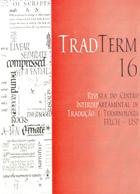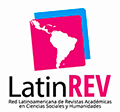A noção de equivalência quando se traduz marcas gramaticais: o caso de mas e suas traduções para o francês e o inglês
DOI:
https://doi.org/10.11606/issn.2317-9511.tradterm.2010.46323Keywords:
Translation studies, Equivalence, Bilingual lexicography, Corpus linguistics, MAS.Abstract
This study, based on a parallel corpora, focuses on the non-equivalent relationships between the markers MAS (in Portuguese), MAIS (in French) and BUT (in English) (Aubert, 1998).Taking into account the history of translation studies, much has been said about the notion of equivalence. Directly or indirectly, translators and researchers have been using the concept in several different ways. Given the lack of definition and contextualization in bilingual dictionaries (Portuguese-French and Portuguese-English), this article calls attention to the underlying mathematical notion of equivalence in traditional bilingual lexicography. Each and every grammatical item, however, presents specific patterns which vary according to its context of use. The results showed a relevant number of correspondents and translating specificities when compared to what is offered by bilingual dictionaries for MAS.Downloads
Download data is not yet available.
Downloads
Published
2010-06-18
Issue
Section
Articles
License
Autores que publicam nesta revista concordam com os seguintes termos:
- Autores mantém os direitos autorais e concedem à revista o direito de primeira publicação, com o trabalho simultaneamente licenciado sob a Licença Creative Commons Attribution BY-NC-SA que permite o compartilhamento do trabalho com reconhecimento da autoria e publicação inicial nesta revista.
- Autores têm autorização para assumir contratos adicionais separadamente, para distribuição não-exclusiva da versão do trabalho publicada nesta revista (ex.: publicar em repositório institucional ou como capítulo de livro), com reconhecimento de autoria e publicação inicial nesta revista.
- Autores têm permissão e são estimulados a publicar e distribuir seu trabalho online (ex.: em repositórios institucionais ou na sua página pessoal) a qualquer ponto antes ou durante o processo editorial, já que isso pode gerar alterações produtivas, bem como aumentar o impacto e a citação do trabalho publicado (Veja O Efeito do Acesso Livre).
How to Cite
Celli, M. (2010). A noção de equivalência quando se traduz marcas gramaticais: o caso de mas e suas traduções para o francês e o inglês. TradTerm, 16, 313-341. https://doi.org/10.11606/issn.2317-9511.tradterm.2010.46323








